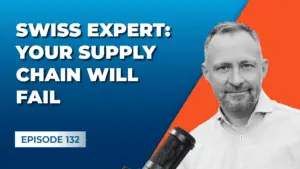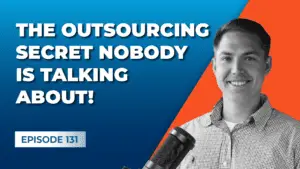The latest in a series of Brexit deadlines is January 31. With no plan for departure left in place, a lot of companies are taking matters into their own hands, reaching out to their contacts and making plans for what might come to pass.
Since no deal has yet been announced, it’s hard to know how to prepare. While we can’t predict the future, we can offer five strategies you can put in place that will set you up for success no matter what agreements the politicians may (or may not) make.
On this episode you’ll hear:
- Our 5 key strategies to prepare for Brexit
- How key relationships can sustain you through any outcome
- Why you need an EORI number
- The importance of NACE codes
If you find yourself wondering how Brexit will impact your company, then this is one episode you won’t want to miss!
Resources
- Procurementexpress.com
- Free Chapter of “Profit Leaks” by James Kennedy and Garret Carragher
- Arvo
- Get ARVO’s Brexit e-Book
Our 5 Key Strategies To Prepare For Brexit
Mike McGrath, founder of Arvo, a procurement company in Ireland which helps people reduce costs and risks, kicked this episode off by discussing five key strategies you can use to prepare for Brexit with James Kennedy.
- Develop long term supplier relationships
Developing a long term relationship with both your key suppliers and your strategic suppliers is crucial to mapping out, preparing for and reducing any risks that Brexit might cause.
- Have a supply agreement with your key suppliers
This will ensure that your supply agreements are not limited to being verbal agreements. It will also give you some flexibility in terms of what breaks and clauses are included in the contract and how these will affect your business.
- Consider group buying
Group buying will reduce some risks that might occur because if there is more than one company working together and group buying, they can leverage the scale.
- Use stockpiling
Although stockpiling is expensive, it works if you are already using it for most of your stock.
- Use alternative suppliers.
This depends on whether or not your current supplier is helping alleviate any of your concerns about Brexit and the effect it will have on your business.
Does their location introduce lots of risk?
Have they not provided you with a breakup plan?
If you answered yes to either of those questions, you should definitely use alternative suppliers.
How Key Relationships Can Sustain You Through Any Outcome
Key relationships are extremely crucial to sustaining you through Brexit. Perhaps you should buy them a nice Christmas gift!
Make sure you are having monthly (or at least quarterly) meetings with your key suppliers. You want to be understanding what is going on in their industry and what risks that can cause and you can discuss how you might mitigate any of these risks. Not to mention, this will also help improve the trust between you both.
We hope you enjoyed this nice and quick episode of The Gross Profit Podcast!
Don’t forget to check out Arvo’s Brexit ebook!
Transcription of This Episode
The Gross Profit Podcast is your one stop shop on the path to profitability. Each week we share authentic advice on the positive, practical steps you can take to make the company you love more profitable. If you’re looking for a positive plan to help you avoid common spending mistakes, control costs, and increase your profits, then this is the place for you. I’m Ryan Cowden and this week we’re joined by James Kennedy and Mike McGrath.
In this episode of The Gross Profit Podcast, James and Mike discuss five key ways you can prepare for Brexit. The latest in a series of Brexit deadlines is January 31st. With no plan for departure left in place, a lot of companies are taking matters into their own hands, reaching out to their contacts and making plans for what might come next. Since no deal has yet been announced, it’s hard to know how to prepare. While we can’t predict the future, we can offer five strategies you can put in place that will set you up for success, no matter what agreements the politicians may or may not make.
On this episode, you’ll hear our five key strategies to prepare for Brexit. These include developing longterm supplier relationships, having specific supplier agreements in place, group buying, stockpiling, and having alternate suppliers. Next, we’ll discuss how key relationships can sustain you through any outcome. Having good relationships with key suppliers is something all good businesses practice, but with the uncertainty of Brexit looming, these relationships will be more important than ever. Make sure your key suppliers know how important they are to you and commit to making your ends meet through the uncertainties of the Brexit process.
Then we’ll talk about why you need an EORI number. Your Economic Operators Registration Identification number is a free number easily obtained that allows you to do business with companies in the EU. In the event of a no-deal Brexit, you will definitely need an EORI number. It’s free and easily obtained, so you should get this as soon as possible.
Finally, we’ll cover the importance of NACE codes. NACE codes are labels that classify physical goods as they are being shipped and will be essential for you if you plan on sending or receiving goods in the future. If you find yourself wondering how Brexit will impact your company, then this is one episode you won’t want to miss. There’s a lot of actionable advice in this episode, so grab something to write with, because you’re going to want to take notes. As always, I’ll be back on the other side to wrap up any loose ends. So without any further ado, here’s our conversation with James and Mike.
Hello and welcome back to The Gross Profit Podcast. It’s James Kennedy here, CEO of Procurementexpress.com. We help hundreds of companies safely spend billions of dollars each year, and I am delighted to be joined today by Mike McGrath. So Mike from Arvo. And maybe you can just introduce yourself a little bit, Mike?
Sure James, thanks. As you mentioned, Arvo is the business here. We’re a procurement company in Ireland. We help clients reduce costs and risks. And like this conversation on Brexit a lot of the risks and supply chain happen around channeling this future trading relationship with the UK and Northern Ireland. And obviously, Northern Ireland businesses dealing with the European suppliers.
Yeah, we’re talking today actually, because you brought out a very invested a lot of action creating this resource for companies. Brexit: Five Actions to Take Now. A Practical Person Guide for Businesses on the Island of Ireland. But I guess a lot of this would be transferable to other countries as well. Mainland Europe, I suppose U.S. it’s going to be same business as usual or some of the same issues could come up from the U.S. people sourcing in the UK, because now they don’t have the old customs procedures. It’s going to be a new set of procedures or we don’t know. Right?
Correct. Yeah, correct. This book has been addressed an Irish audience, but the same principles in this book would apply to all of the countries in Europe, France, Holland and Belgium that might be trading daily with the UK, and business in those areas. The U.S. you mentioned, wouldn’t be directly impacted in the short-term but as trade agreements change and evolve, some of these issues may arise as well. So, I suppose the principles here are producing some supplier risk and be that through Brexit or any other eventuality that might occur in this election.
Yeah. Well there’s actually a lot of the great resources on in the book. We won’t have time to go through all of it, but they’re at a high level I think it’s safe to say, and at least a good portion of these could be applicable to any business, whether there’s Brexit happening or not. And that’s just best practice, which is to hand. So you’ve picked out five things in particular, key actions that people should be, a company should be planning for. So, what are those and how would you get started with it?
We’ve narrowed it down I suppose, and not all actions are relevant to all businesses, depends on the risk within. How’s it going to affect the business on Brexit as well. But the five actions that we have, and I can list them and then go into a bit more detail. The first one is the absolute first one is to develop longterm supplier relationships. So your key suppliers or strategic suppliers, which may be identified through what’s called the credit analysis. It’s worth developing your longterm relationship with them. Developing a partnership approach that whatever Brexit, whatever shape Brexit is. Whatever occurs, that you are getting this partnership approach with them and you’re working through risks and issues that arise.
The second thing is looking at having an agreement or a supply agreement in place, with your key suppliers. So that there’s guarantees with the suppliers and that was a better formality in terms of relationship as opposed to just ordering products and certainly hoping that they arrive. It’s formalizing that and having some breaks and clauses in there with regards to what might happen if currency goes up or down by five or 10%. What happens is in the position of duties and taxes. Does only one NSX rooms, CE marking or retread decisions. How’s that going to impact relation? Those are the first two.
The third one that we would recommend is to consider group buying. So some risks in the supply chain maybe when a particular location as an example, you cannot not know that European businesses may have a particular bottleneck emerging there. Estimates in particular wouldn’t… May not have the capacity to storage, to resources or they may not be meeting minimum order quantities to bypass that risk. What if they work together they group all of the leveraged the economy scale in that scenario. They might be at the bypass the risk if it was, it has been proactive… It has been useful to for the last number years.
Those cost reduction would have this with bypass tricks on risks. The second mass example that we would come across it would be the actions to consider stockpiling. Now that has been a costly exercise for many businesses in Brexit on first deadline on March, 2019 when a lot of businesses were stockpiling and warehouses products and services as they spare parts and the phones, and unfortunately there was cash tied up there on some of those products are still sitting in those shows until they have a new store.
Stockpiling works.
When it’s a key component that you’re going to use anywhere stock piling works or we call it.
What is that?
It’s not a silver bullet.
Yeah. And then finally you have listed here alternative suppliers. What does that mean? Alternative suppliers on your own in the Island of Ireland for example?
It depends on your current suppliers risks and their location and if they’re not engaged in what you want to break the conversation. If they don’t have a breakup plan, if they’re not ready for the administration and paperwork that’s coming down the track, it might be worked for Ireland. We have trans practically looking for alternative suppliers. Its good practice and you shouldn’t have a single source of supply friendly and wherever possible. So finding alternatives wherever they may be on the planet. It’s a good practice but it does take time. It takes time to identify them, let them negotiate on the standard business credit terms, on the standard culture. And I’ll see the product service system as well as they ought fit into your supply chain.
So that is an active strategy or an action that companies are taking. This is slow process. We’ve seen cases where it takes six to nine months to find an alternative single supplier. So don’t be thinking you’re going to do dash the 1st of February 2020 if UK crashes off without a deal and you need to find an alternative supplier. We need to start to know that if that’s something happen that’s a risk to your business.
So I mean developing relationship with the suppliers and you go throw to some of the book, some guides on how to actually identify those, but once you have identified the suppliers that you want to build a better relationship, what’s the practical way to do that? You send them something for Christmas, a bottle or something typically in Ireland or what are the practical ways that you can actually build that relationship with them?
You are absolutely correct. It’s your key suppliers that you’ve identified that are vital to the business and you’re developing a relationship or partnership with them, which is appropriate for your understanding per sector on that and that works in different ways. A gift for Christmas is beneficial in terms of practical business operations, we would say monthly or quarterly meetings with key suppliers, building up a relationship with what’s working for both sides of this coin, so as always been about negotiation and give and take and having a proactive quarterly business review, which are key suppliers, understanding what’s happening in the industry, in the sector, understanding what’s happening in their business, how engaged general risks are on Brexit. It worked well and meeting… I did this face to face if not conference call and that’s worked well.
And then it’s not just about what you’re getting from the meeting, it is beyond the meeting and saying I’m standing for what you might get to do for… we have partners and so improving credit terms, excellent payments increasing or whatever it is that would help improve relationship, developing that trust, understanding where the business they’re going as an operation and investing time yourself to make sure that whatever happens with Brexit or any of the risks that your partners on the same page and can walk through.
So if you’re on the upside or maybe working on a procurement team, I guess you have to put a case out for to leadership about the value of maybe going to meet some of your suppliers and investing that time in us and explaining how it’s going to be worked at in terms of mitigating risks when should and when problems do arise. And I guess that’s not exclusive to Brexit but it’s any supplier that is key to your business in order to maintain that supply. You should invest upfront so that when something goes sideways, maybe you’re the first team to get looked after as opposed to everyone else.
Absolutely. That’s it exactly. So if the supplier is proactive and engaged and honest and you have a good relationship with them, I’m sure they’ll let you know as soon as there’s an issue with that product or service coming down the track. So if you don’t have that relationship with them, if you’re not a tier one customer to them, you may be the second vessel on understanding what’s happening with our business and how they’re going to help you is worthwhile and vice versa. You need to be considered what’s impacting them as well and see how you pass the chance operation strategy to be more meaningful to that relationship.
Have you any examples of firms you’ve worked with where they’ve done that on it’s paid off?
Yeah. I know, we’ve taken care of our own brains at the moment. We’ve seen a number of UK and old merge businesses, setting up operations in the social and some of those operations have been set up in apprenticeship with key customers. So customers have upheld some by locations warehousing, helping with some of the airport administration. So the customers benefiting because not all suppliers are in same jurisdiction, so depending on the risks whenever the supplier… It makes sense to help where you can and the long term benefits is to benefit everyone. That’s benefit for all practice.
Good. So I guess there are some practical changes that are going to take place now and when ordering and so on is going to be a lot of people do import from anywhere. We’ll be familiar with these, but there’s new encodings that are going to be more important. For example, to EORI. Maybe if you can just walk through what that is and maybe we’ll talk about the NACE codes as well. People also need to be aware of.
Yeah, the EORI is a good example. It’s a number, which most people aren’t aware of in terms of… And back in the last 20 years, you didn’t need an EORI number. It’s not difficult to get, but 60% of Irish importers, yes, don’t have one according to revenue of last month. So 60% of businesses they bought from the UK last year, have not got the EORI number. It’s easy to get it and I’ll explain what it is after the put in terms of getting it, you just login to ROS align Revenue Online Service, and you tick your tax registrations and you tick a box saying customs and import. So that gets you an EORI number. It is your VAT number or your revenue number where you just need to apply first. The UK have a more proactive data centers and the EORI to all importers and exporters. So that was a proactive approach, which I think you should consider.
The reason you need an EORI number. It’s a unique registration. It’s required on your import and export documents. It’s a first form that you fill out first page before you should up the rest they’ll ask your EORI number. If you came and you need to purchase a product or service there, you need to fill out this paperwork, and they going ask you to screen your number. If you don’t have this, how do you go through customs, airport, without those, the shipments will stop. So you won’t escape that problem. So that’s why the EORI number is important. It stands for Economic Operators Registration and Identification, like I said, it’s easy to get it. So it’s a revenue number so it’s available from revenue I had much to say and it needs to be gotten as soon as possible and then it should only take ten minutes through.
So do you need to submit that number when you’re placing an order with a vendor or on a purchase order where… How is it used?
Every single time you’ll be importing or exporting from uncharged country. So from a country that’s outside the EU, companies that are buying at the moment from China, in States or Brazil will know what EORI numbers because they’ve been using as separately. If your freight forwarder might have it on your behalf if you’re dealing with freight forwarder. So in future, if there is an agreement or a deal done with the UK, you will need that EORI number. It doesn’t cost anything to do it. So it’s worth the 10 minutes administration to get it, because again you want it to ship and to stop, to ship the documents, to paperwork because these papers will not be approved going through the ports and the products will not arrive in this country.
And I guess it’s worth covering off. This is just for physical products. So if I’m buying something from I don’t know software for example, is that going to apply?
No, you’re correct. It’s for the movement of physical goods, whether it’s parcels, containers, whatever the dish farm that is, you will need that EORI number.
And in addition to that, there is a NACE code, which is also going to be required or is that optional?
No. The NACE code is number as well as for defining activity or a product. So if it’s wood or textiles or plastics or some components there is a NACE code, which is required. Like I said, it’s a classification code for product. It’s used for reporting really would… If you’re going in packaging of boxes, you need to describe what’s in, what’s materials made of, you need the NACE code carbon, things on top or whatever. This is what in the package. So those NACE codes are… NACE as in N-A-C-E are available online. CSO would use them for reporting and it’s worth knowing of their completion of the paperwork accurately. Unfortunately, the import documentation that you’re talking about for Brexit is called… it’s a lengthy piece of paperwork and it’s the files, forms are filled. I need to fill out on the form. So it is in one of NACE code, which you’re contacted it tells them your EORI number or all the Arizona food suppliers, the valuers, et cetera and the NACE code.
Great. So you mentioned the strategy right down into the nitty gritty of getting to fill out paperwork. All of us more on tactics and mostly myself. So that’s interesting. I find that interesting. So thanks very much Mike. Where can people find and more get a copy… Buy the book or and get a copy of it and get in touch with you.
Sure, yeah. Our website is the central contact point. The ebook is available handle homepage downloads. It’s a free ebook so it does not cost. Hopefully it’s an introduction for our work around strategic sourcing and procurement is what we’re doing like you said, you mentioned it is on… A lot of this practice is good. It’s good to supplier management. Anyway it’s not just for rights I suppose it’s worked. It’s worked really members of the supply chain and all that information is on the website. I think there’s a chapter towards the end of the book, helpful tools and supports, so we’ve listed all financial support tools and tips to templates, a bit of online for a lot of the breaks, that actions, so we started categorizing those and there was a section in the book, which summarizes all those and links to them as well, so it might find that useful. Like I said, it’s on the web search.
Super. Thanks very much and yeah, all the best. Thanks very much for that. That was very useful.
Thank you James.
All right folks, there you have it. That wraps up our conversation with James and Mike. They shared five key practices to guide your business through the rest of the Brexit process. We also shared some tools and resources, which will all be linked up in the show notes. Don’t forget to click on one of those links to get a free chapter from the book profit leaks by James Kennedy and Garret Carragher I hope you enjoyed our conversation. Please consider subscribing, sharing with a friend or leaving us a review in your favorite podcast directory. Until next time, best of luck in all that you do and we’ll look forward to seeing you on the next episode of the Gross Profit Podcast.




